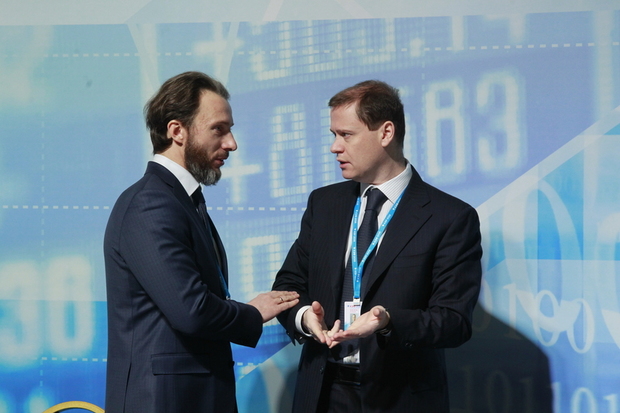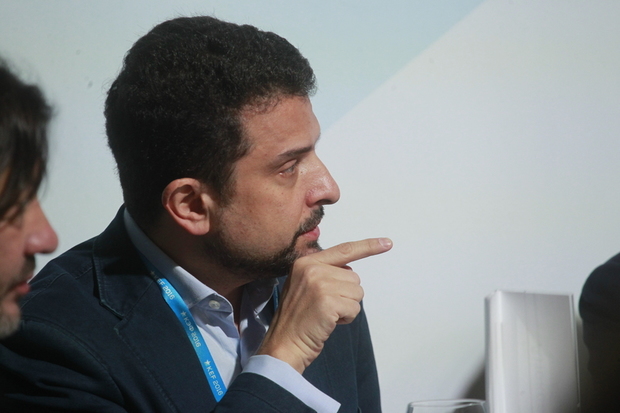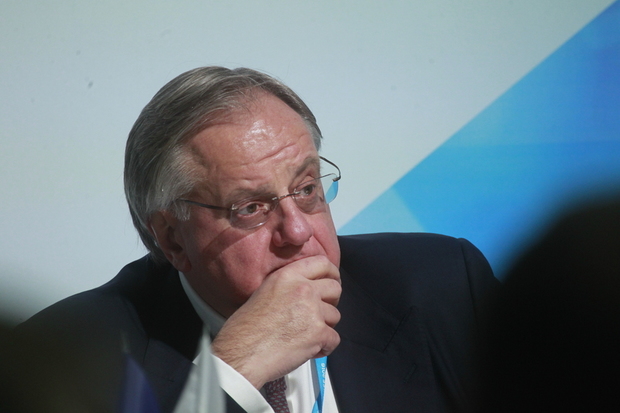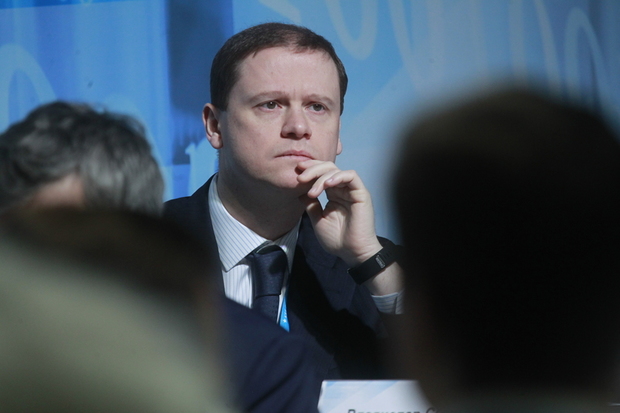Krasnoyarsk Economic Forum 2016: ‘Hydrocarbon growth model has died!’
About how Dvorkovich defended the ideas of autarky and why achievements of the Russian economy for the last 15 years have been ‘erased’
Last weekend Krasnoyarsk Economic Forum (KEF) finished. The Forum is on the development of Strategy 2030 in the conditions of the crisis in the world and particularly in the Russian economy — with falling prices for raw materials and the devaluation of the ruble. The correspondent of Realnoe Vremya, having visited it, found the business breakfast, held prior to the plenary session and turned out in the sidelines, much more curious and even startling than the key discussion of the forum — due to the predictions of its speakers, as well as to the fighting in the camp of the Russian authorities and economists.
'Gref's chick-ghosts' at Krasnoyarsk Forum
The main event of the Krasnoyarsk Economic Forum (KEF) — the statements of officials and experts at the plenary session 'Strategy 2030' — has been eclipsed with the business breakfast 'Geopolitical trends and future of Russia'. It is clear from the topic that breakfast meeting at 10 am anticipated topics of the plenary meeting.
In fact, the business breakfast was of futurology character: due to predictions about what the world (and Russia in the world) will be in the near future. It was Herman Gref who promoted business breakfasts in Russia. They were at St. Petersburg and Sochi forums, as well as at Gaidar Forum in Moscow.
The main speaker at breakfast of KEF was Deputy Prime Minister Arkady Dvorkovich, the moderator – instead of Gref – publicist and Professor at the Department of Media Communications of the Higher School of Economics Aleksander Arkhangelsky.

'A small revolution has taken place: hydrocarbon growth model has died, died!'
Arkhangelsky asked to speak first to Dmitry Belousov (Andrei Belousov's brother, who – surprise – also was the head of the Ministry of Economic Development of the Russian Federation in 2012-2013), a head of the Laboratory of Analysis and Forecasting of macroeconomic processes, 5 years ago participated in the development of the failed strategy '2020'.
'A small revolution has taken place: hydrocarbon growth model has died, died!' he said, without grieving. 'There will not be rent [oil] this year. This is the first today's trend. Trend number two is the technological revolution. We stand on the threshold of rapid technological change. Old opportunities are closed – as the manufacture of typewriters disappeared, today one after another smokestack industries are dying.
On the horizon of 2030-2035 the work of superaccumulations will dramatically reduce energy consumption. We will reduce fuel consumption. There will not be a peak demand for hydrocarbon fuels anymore. Today there is a sharp compression of fuel markets.'

'Economic Pythias', Chinese echo and the fourth industrial revolution
The second Pythia, Vanga or Nostradamus was Evgeny Kuznetsov, director of project office, a member of the board of JSC RVK. Kuznetsov also was not sparing of words. In general, people like to say big words at economic forums: the more revolutionary and riskier the prediction, the stronger 'an economic Pythia' attracts attention. He began, however, with trivial, but, for all its obviousness, very true maxim: 'An attempt of any industry to maintain the status quo is doomed to failure'.
'The symptoms that are usually noticed today only in the oil market, actually manifest themselves in all. But the key players don't care about peaceful development, they care about the imbalance,' he said.
According to him, those win who do not sail safely from a harbor to a harbor, but who hope to storms and changes every time and is able to ride the wave, what needs to be done in Russia too, said Kuznetsov. What is more, today is 'the fourth industrial revolution', and as previous revolutions led to tensions and world wars, we also should expect revolutionary changes now.
In general, today's 'revolution' is a period of very rapid, profound and unpredictable changes, he concluded, and many processes are, in principle, uncontrollable (in other words, if anything happens, we'll get nothing out of him).

'Stolypin's' Klepach: attacks on Kudrin and Sun Bin
'In what extent does the forecasting depend on ideological positions of the economists? Is it possible the reconciliation of liberal, conservative, nationalist forecasters?' Arkhangelsky asked Klepach.
'Well, I'm not the initiator of the law,' said Klepach, stating that he was only asked to develop on the instruction of President Putin. 'Regions did influence, which put the issue of plans and forecasts. There was much debate we had with former Minister of Finance Kudrin, who opposed us. And now he actively discusses the role of strategic management!' he attacked his foe of long standing.
Klepach, as a Slolypin follower, drew a parallel with Bun Bin, a Chinese strategist and military theorist of the fourth century B.C., who said that 'Strategy without tactics is a slow path to victory, but tactics without strategy is the vanity before defeat.'
'We have tactics, but how this tactic helps to solve a strategic problem of development of country's laws? It doesn't matter today, whether the idea liberal or conservative – the definitions themselves are vague! The problem is, what are the recipes,' he said.

Klepach: 'Conservatism means that we stand our own ground!'
But, having said that, Klepach immediately wondered what are the limitations that life imposes on freedom. According to Klepach, we have 'an extremely liberal regime of capital circulation'. They say that in Kazakhstan there is too liberal economy, but a system of control over remittances is tougher than our's.
'Conservatism means that we stand our own ground!' Klepach attacked the previous speakers.
Arkhangelsky listened to Klepach, but apparently at his 'anticonservative' speech at the plenary session thought of Klepach as his ideological enemy. On top of all, Klepach, in refutation of the position of Belousov, stated that 'hydrocarbons will still remain at the core of the Russian economy'.
Why Dvorkovich does not want to abandon oil dependency and the idea of autarky
Arkady Dvorkovich in his rather confused speech made it clear that 'technology will develop very quickly', but in Russia things are changing very slowly today. Why? In his opinion, because there is a combination of progressive technological processes in different industries at the same time, that at first glance it is difficult to determine.
'We should not just react to change, we should understand how we should react to what happens,' said Deputy Prime Minister, making it clear that he will not allow zealous liberals to react in a 'Western direction'.
Dvorkovich, as it turned out, almost welcomes the decline in oil prices and the devaluation of the ruble, as Russia had the potential of import substitution. Oleg Deripaska later, at the plenary session, called the idea of import substitution as 'fog, a model of the XIX century'.

'Klepach said about the hydrocarbons, that they will remain the core of the economy, it is probably true. It is foolish to abandon natural wealth. Other two of our wealth — the land and people. Land – the ability to provide ourself and the world. People – the ability to determine the development. As for tactics, it is important to establish real trust between various institutions of society, state and citizens. On consensus-based rules of the game projects can be implemented. Autonomy and independence in decision making of Russia are determined by financial autonomy – the absence of debt and credit. For all the dislike to the Finance Ministry by all the members of the government, we should remember of financial independence of our country,' Dvorkovich let know that takes the side of the conservatives and does not want to abandon at all the oil dependence.
It is curious that Dvorkovich in his speech said almost nothing about cooperation with the advanced countries of the West to advance the country with current technology, but he said a lot about independence. But the ideas of self-reliance of Juche in North Korea, particularly in the areas of the economy, was also about independence. Let's hope that Deputy Prime Minister was referring to something else, and not an idea of autarky.
Shulgin as a cyber Pythian, or what to expect from the decentralization of the economy and of the Internet
The most surreal Pythia at the business breakfast was Aleksander Shulgin, a venture investor, a composer and an 'imagineer' (as Arkhangelsky said about him).
'The Davos Forum has just finished, where the theme was industry 4.0 [term covering a number of modern automated systems, data exchange and manufacturing technology; the collective term for cyber-physical systems, 'Internet of things' and 'Internet of services' — editor's note]. They talked about all kinds of changes and transformation. At breakfast, they concluded that it will be not even transformation, but metamorphosis. It is needed that infrastructure determines what the economy will make. Also, they talked about the blockchain [built according to certain rules, the chain of blocks of transactions, realized in the creation of the cryptocurrency 'Bitcoin' — editor's note]. Then it will be industrial Internet (Internet of things) and 'energy of all'.

Top manager of Nornickel: 'We're looking for the autarky – that is, do nothing!'
Arkhangelsky, having heard of Davos talks of 4.0, asked Vice Premier of Norilsk Nickel Andrey Bugrov why they talked about industry 4.0, but not about Russia.
'It would be rather important to understand whether there will be conditions for us and whether the Russian Federation will be an exporter of capital. There are changes all over the world. Large Pacific partnership is arising – and this is 30-40% of global GDP. The EU and the US are discussing the Transatlantic partnership. In this context, Russia's prospects are not rosy. And it's not due to low prices. Unfortunately, trading trends will result in a reduction of our market share. And for some reason we are looking for the autarky – that is, do nothing! Many things began to change. In Asia, a new development Bank was created at $100 billion, and another Bank of $100 billion. For what reason? This is a consequence of dissatisfaction with the Bretton Woods system and globalization. But, alas, our genome does not want to change for some reason,' recognized the businessperson with bitterness.
Being offended by the 'our genome', Dvorkovich did not tolerate:
'About Chinese development institutions: in addition to the conspiracytheory that we are supposedly not allowed there… I must say that the main thing — none of our professionals did not want to go there! This is, perhaps, about the genome of the whole society, but also about the generation of professional financiers!' said emotionally the Vice Premier.

Why 'China is over' and how the current crisis has 'erased' the results of 2000-2015 years
Other top manager of the company of Krasnoyarsk Krai RUSAL Vladislav Soloviev rightly said that they all say about forecast 2030, 15 years from now. And waht was 15 years ago? In 2000-2001. From his speech it became clear that the current crisis has actually 'erased' all the achievements of 15 years. So, he sadly drew attention to the fact that prices in markets are falling not only on oil but also on aluminum (for RUSAL it is painful):
'Today is the end of commodities super cycle (which began in China), when we discussed that 'China will never end'. But now all it has ended! We are witnessing the fall of prices not only for oil but also iron ore, aluminium, nickel – all returned to the level of 2000!'
He believes that to compete today on cost – it 'an impasse and the nineteenth century'. The only thing that can make Russia is 'to initiate the production of commodities that would be competitive'.
If you remember about how much all these 15 years they talked about the need for raw material processing, and not total sales of oil on foreign markets, in order to remove the economy from oil dependence, we can only shrug: Solovyov said what they said 15 years ago. But, what is obvious to us, looking from 2016 in the recent past: almost nothing, unfortunately, absolutely nothing has changed.